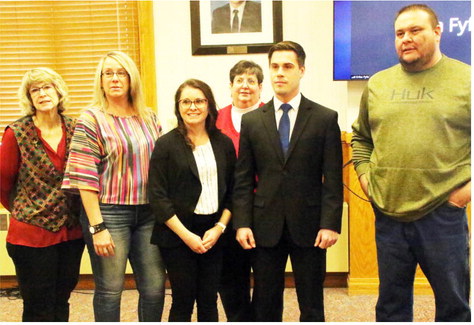Winners, Losers Of Montana Legislature
Montana Free Press
Montana’s 67th Legislative session formally adjourned Thursday afternoon, with dueling sine die motions from the House and Senate bringing legislators’ work for 2021 to an official end.
This year’s session was the first since 2003 where a Republican- controlled Legislature had the chance to pitch laws to a Republican in the governor’s office — a dynamic that delivered the state a wave of conservative policy. As proceedings came to a close Thursday, Republican leaders touted tax cuts, free market health care measures and the passage of what they called a responsible, fiscally conservative budget.
“The 67th Legislature is one Montanans can be proud of,” said Speaker of the House Wylie Galt, R-Martinsdale.
“I think we’ve shown Montana that we deserve to be here to legislate,” said Senate President Mark Blasdel, R-Kalispell.
Minority Democrats said Thursday afternoon that their caucus had been successful in helping shape major legislation, such as measures spending federal COVID relief dollars on major infrastructure initiatives.
“That money is going to do a lot of good in this state,” said House Minority Leader Kim Abbott. “Our fingerprints are all over that legislation.”
In all, Montana’s 50 state senators and 100 state representatives introduced a total of 1,313 bills and resolutions since the Legislature convened in January. Of those, nearly 400 have passed into law and another 300 are either awaiting the governor’s signature or en route to his desk.
As lawmakers head back home — and their constituents evaluate the work they did — here’s an initial look at the session’s winners and losers.
Winner: Gianomics
A newly sworn-in Gov. Gianforte kicked off the legislative session in January by proposing a suite of tax cuts he said would create jobs by making Montana a more competitive destination for entrepreneurs and relocating out-of-state businesses. Despite opposition from minority Democrats, who wanted fewer tax cuts for the rich and more relief for lower-income Montanans, legislative Republicans ushered nearly all those proposals into law.
The highest-profile tax proposal backed by the governor reduces the tax rate assessed on Montana’s top earners from 6.9 percent to 6.75 percent starting in 2022. A separate measure rewrites much of the state tax code and eliminates several tax credits in order to bring that rate down to 6.5 percent starting in 2024. Republicans have called the reductions an initial step toward making Montana competitive with other states in the Rocky Mountain West. Democrats note Montana is the only state in the region without a sales tax.
Other laws supported by the governor will exempt more businesses from the state business equipment tax and carve out a capital gains tax exemption for entrepreneurs who cash out after building Montana- based businesses.
Democrats took several passes at providing property tax relief and expanding income tax credits for low-income families without garnering Republican support. Republicans did, however, pass a measure that lowers property taxes by offsetting some local school taxes with marijuana tax revenue and about $10 million a year from the state’s General Fund.
Winner: Vaccine Skeptics
One of the session’s late-breaking dustups arose from a cadre of Republican lawmakers and citizens who voiced deep reservations about the nation’s rush to vaccinate against COVID-19. Claims of widespread adverse side-effects mingled with allegations of immunization mandates to propel passage of a bill barring government agencies and private businesses from making vaccination a requirement. Hospitals countered that the broad language of House Bill 702 encompassed not just the COVID-19 vaccine, but vaccines for influenza, measles, whooping cough and other communicable diseases, resulting in a threat to the safety of staff and patients and to hospitals’ ability to comply with federal health regulations.
Ultimately the Legislature approved HB 702 after receiving assurance from the governor’s office that the bill would not create added risk for health care facilities. Gianforte returned HB 702 with an amendment of his own that more directly addressed those concerns. And while several Republican lawmakers expressed hesitancy in voting for the bill, they decided to take the governor at his word and grant vaccine-mandate opponents their wish. HB 702 was sent back to Gianforte on the final day of the session. Loser: Marginalized Voters
Throughout the 67th Legislature, voting rights groups fought hard against a litany of bills they argued would disenfranchise large pockets of voters across Montana. Among the more controversial proposals was a pitch to eliminate same-day voter registration, which has been established practice in the state since it was approved on the 2004 ballot. Opponents of House Bill 176 frequently noted during testimony that tens of thousands of people have registered on Election Day over the past 15 years, and that 56 percent of voters statewide rejected a ballot measure to end same-day registration in 2014. Organizations representing tribal interests were particularly incensed, saying that voters in Indian Country have relied on the ability to register and vote in one trip to overcome geographic and transportation obstacles. Their appeals went unheeded by the majority of lawmakers. The deadline for voter registration is now noon the day before an election.
Running parallel to that debate was a concerted effort to defeat Senate Bill 169, which places new restrictions on the types of photo identification Montanans can use to register and to vote at the polls. Again, voting rights advocates hammered the negative impacts of such a policy on marginalized voters, namely college students and tribal members who may not have access to the types of documentation required by the bill. A third measure, which would require county election officials to update voter databases annually, was condemned by opponents as an effort to purge the state’s voter rolls. Those bills were also signed into law.
Those opposed to the recent changes to Montana election laws haven’t given up. Immediately after Gianforte’s signing of HB 176 and SB 169 last week, the Montana Democratic Party filed a lawsuit requesting that Secretary of State Christi Jacobsen — who requested both bills — be barred from enforcing them.
Winner: Organized Labor
At the session’s midpoint, union members from across Montana packed the House gallery to witness a key vote on a bill they’d spent weeks opposing. The so-called Worker Freedom Act would have implemented sweeping changes to state laws regarding organized labor, including requiring employers to obtain written consent from workers to deduct union fees from their paychecks. It was, according to AFL-CIO Executive Secretary Al Ekblad, the first major piece of right-to-work legislation to hit the House floor in decades.
Right-to-work advocates had been pushing hard for change well ahead of the session, circulating mailers throughout Montana calling for what they characterized as freedom of choice for workers. Some Republican lawmakers took up that call, with one arguing in a rhetorical flourish that the Worker Freedom Act would unchain the state from the “shackles of compulsory unionism.”
In the end, the House voted down the proposal, effectively ending the debate. And while union members continued to weigh in on other issues impacting their fellow Montanans throughout the session, they hailed the failure of the Worker Freedom Act as an early and significant victory for workplace safety, good-paying jobs and their right to collective bargaining.
Mixed Bag: LGBTQ Rights
This session saw a number of Republican-sponsored proposals that would, if enacted, have adverse effects on transgender, nonbinary and two spirit people, particularly youth seeking gender-affirming medical treatments and student athletes. Another policy signed by the governor, the Religious Freedom Restoration Act, was also heavily criticized by LGBTQ Montanans for opening the door to increased discrimination on religious grounds.
Not all of those proposals, however, were passed or signed into law. Even with Republican majorities in both chambers, the sweeping transgender medical ban, House Bill 113, saw an early defeat in the House, while a later version of that same bill, House Bill 427, was sidelined in the Senate. Both outcomes required a consistent bench of Republican opposition, which LGBTQ lobbyists and allies claim as evidence of hard-won victories.
Other bills were passed through the Legislature, despite opposition from Democrat caucuses and some Republicans. Those measures, House Bill 112 and Senate Bill 280, would ban transgender women and girls from competing on women’s sports teams and would require surgery and a court order for anyone wishing to change the gender on their birth certificate. Both bills now await the governor’s endorsement or veto.
Taken together, many advocates for LGBTQ civil rights agree they were pummeled by an onslaught of hostile legislation. The trend, they said, was even harder to fight given the substantial Republican majority in the House and a general lack of understanding about transgender people. Since the beginning of the session, however, lobbyists and allies have said they made headway against waves of misinformation and were heartened by growing community support from medical providers, education associations, student groups and businesses. The widespread opposition to these bills, culminating in the defeat of some measures, has LGBTQ advocates claiming successes in an otherwise bruising session.
Winner: Public Education
The past year has been markedly tough for teachers and students in Montana schools. Virtual classrooms, strict public health protocols, limited access to school resources — the pandemic touched on nearly every aspect of the school experience. Those challenges spurred lawmakers to closely examine a slate of policy changes aimed not just at softening the lingering effects of COVID-19, but bolstering the state’s education system for the long haul.
For students, change manifested in the ability of local schools to better tailor education based on individual needs. House Bill 246 won strong bipartisan support by enhancing skill-based educational opportunities for young Montanans and granting school officials the authority to modify or waive course requirements on a case-by-case basis. Lawmakers also passed a measure folding inflationary increases for special education into the state’s routine budget, supporting the future stability and availability of funding for special ed students. That bill is still awaiting Gianforte’s signature.
For educators, HB 246 streamlined the teacher licensing process and added a new license to state law that will strengthen the role local trade professionals can play in classrooms. Maybe the biggest moves lawmakers took toward improving the lives of teachers and tackling the state’s long-standing teacher shortage was the early-session passage of House Bill 143, which steers additional state funding to schools to incentivize salary increases for educators in their first, second and third year on the job. The Legislature made quick work of HB 143, and it was signed into law in early March.
Lawmakers also played a substantial role in deciding how to allocate nearly $500 million in federal COVID-19 relief funds flagged for Montana’s public schools. The key priority was to mitigate the financial impacts of pandemic- induced fluctuations in student enrollment, which has declined more than 2 percent since spring 2020. Federal money will now be used to fill any gaps in school funding as those students return, and address adverse impacts on student learning resulting from more than a year of stress, uncertainty and disruption.
Loser: Wildlife
The 2021 Legislature was not kind to bison, wolves and bears.
Attempts by Democratic lawmaker Martin Weatherwax, D-Browning, to facilitate the transfer of wild bison from Yellowstone National Park to tribes stalled, while bills by Josh Kassmier, R-Fort Benton, and Kenneth Holmlund, R-Miles City, restricting the movement of wild bison passed the Legislature with broad Republican support.
Holmlund’s bill changes the definition of wild bison in a way that will make it difficult for new herds to become established in the state, which aligns with the approach the Gianforte administration appears to be taking on bison management. Kassmier’s measure requires county commissioners to sign off on any bison relocations within their jurisdiction. Proponents for both measures referenced brucellosis risk and the impact the disease could have on ranchers when arguing for those bills.
Eight members of the Legislature’s American Indian Caucus referenced anti-bison legislation in a letter sent to Interior Secretary Deb Haaland this week seeking assistance from the Department of Interior to restore bison on federal lands in Montana.
In terms of predator hunting, Montana’s wildlife management policies are starting to closely resemble those in Idaho, which is much more lax in terms of how and when hunters can harvest animals. Lawmakers passed four bills aimed at lowering wolf populations, wrote into law a season for hunting black bears with hounds, and passed two bills and a resolution seeking to add more state influence in the management of grizzly bears, which are federally protected by the Endangered Species Act.
House Bill 468, sponsored by Rep. Paul Fielder, creates a spring hound hunting season for black bears and a chase season to follow, which according to critics could lead to fatal outcomes for humans, bears or dogs.
Bruce Gillespie, a Republican senator who lives near the Rocky Mountain Front, sponsored a successful bill that would allow people to kill grizzlies that threaten livestock. (Current law allows killings if a bear is threatening a person or actively attacking livestock.) And Senate Bill 337, sponsored by Sen. Mike Lang, R-Malta, prevents Fish, Wildlife and Parks from relocating grizzly bears outside of pre-approved grizzly management zones, which opponents argued will lead to an increase in the density of problem bears and force wildlife managers to kill more bears.
Winner: Anti-abortion Advocates After 16 years of Democratic governors reliably vetoing abortion restrictions, Republican lawmakers succeeded this session in codifying a range of bills meant to curb abortions at various stages of pregnancy. Three of the proposals were signed into law on Monday by a beaming Gov. Gianforte.
The slate of bills that originated in the House breezed through committee hearings and floor votes in both chambers, despite consistent arguments from Democrats that the bills infringe on a patient’s right to privacy and are unconstitutional. The legislation includes widespread restrictions on medically induced abortions early in pregnancy, a ban on most abortions after 20 weeks of gestation, and a requirement that providers offer an ultrasound before a procedure.
Even if the bills are challenged in court, Gianforte’s endorsement is considered a seismic win for Montana Republicans who have long opposed abortion and used the issue as a political tool for railing against Democrats who support the right to reproductive autonomy.
Winner: Private Schools
Proponents of school choice in Montana entered the 67th Legislature with quite a list of goals. Most of the proposed policies they argued would expand educational opportunities for young Montanans failed to sway a majority of lawmakers. A sweeping measure aimed at establishing an autonomous statewide charter school system died without so much as a floor debate, while another bill redirecting public school dollars into separate accounts for special needs students pursuing other educational avenues cleared the House only to stall in the Senate.
But private schools — and, by extension, the school choice advocates supporting them — did claim a key victory with the passage this week of House Bill 279. The proposal builds on a controversial tax credit program for private schools approved by the 2015 Legislature and upheld by the U.S. Supreme Court. With HB 279, which has yet to be signed by the governor, individuals will receive a dollar-for-dollar tax credit for contributions to private school scholarships up to $200,000. The previous credit cap was $150. HB 279 sponsor Rep. Seth Berglee, R-Joliet, told lawmakers the cap increase would finally make the tax credit scholarship program “usable for Montana families.”


